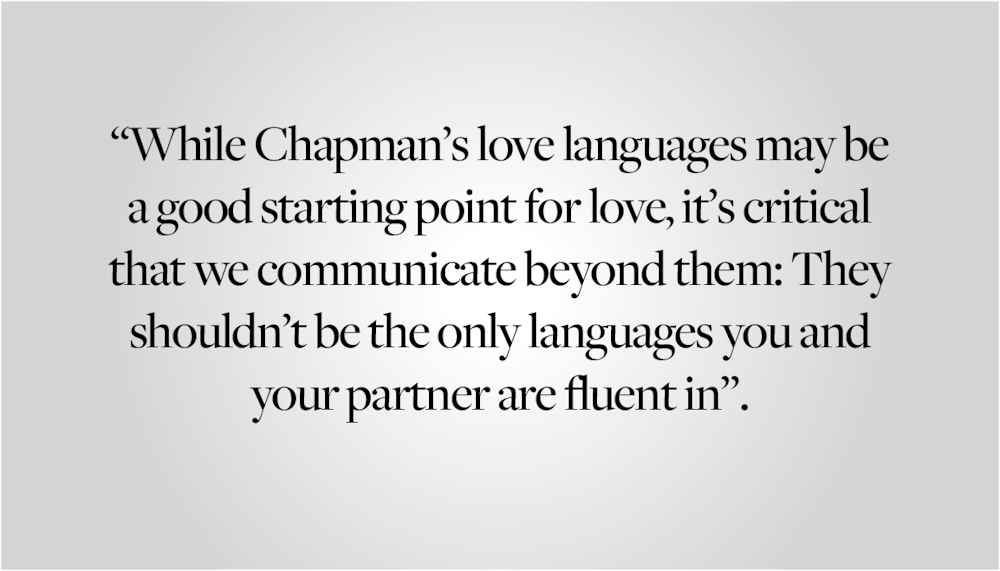At one point or another, I’m sure we’ve all come across the famous love language questions: “Do you prefer words of affirmation or acts of service?” or “Do you express love as gift giving or quality time?” If you’re anything like me, it can be difficult to settle on just one answer.
We live in an age where we are obsessed with categorizing ourselves. From Zodiac signs to Myers-Briggs Type Indicator results, it can feel a lot easier to process our complexities through a set of predetermined ways of being. Love languages are no exception. They offer a framework for understanding romantic relationships, defining five distinct ways people prefer to give and receive love: words of affirmation, quality time, gifts, acts of service and physical touch. Love languages speak to us because love is complicated, and we are constantly searching for ways to explain it. And if there is an opportunity to compartmentalize a romantic disconnect by saying it's just a matter of conflicting love languages, why not take it? That can feel easier than a deeper exploration into the compatibility of your relationships. Treating love languages as the crux of your relationships, however, will only lead to worse outcomes down the road.
The idea of love languages was first introduced in a book titled “The Five Love Languages: How to Express Heartfelt Commitment to Your Mate” by Pastor Gary Chapman. Chapman’s central idea is that love languages are interchangeable, meaning that people tend to give love in the way they want to receive it. He emphasizes that open communication about these love languages can help couples avoid making assumptions and instead provide each other with the love and support they truly need.
But Chapman has faced some pushback on his work, with critics bringing into question the validity of love languages as a sufficient way to understand intimate relationships. For one, he refers to himself as “Dr. Chapman” for his PhD in adult education, yet has no formal training in medicine, psychology or marriage counseling. Secondly, his conclusions were based on anecdotal experiences working with primarily Christian, presumably heterosexual, married couples, who are not representative of the greater population. A research study done using Chapman’s own Love Language Quiz, for example, found that couples with different love languages were not any more dissatisfied in their relationships than couples with matching ones.
Not only do love languages inaccurately determine compatibility, but they also unnecessarily restrict us from showing our partners intimacy in all its forms. Having to choose one way of giving love — physical touch, for example — can unintentionally cause us to neglect all of the other important expressions of affection, including words of affirmation or quality time.
To move away from the love language framework, it’s essential to recognize that love and our experiences of it are fluid and multifaceted. There is no such thing as a “primary love language” because a single type of love is insufficient for one person’s emotional needs. It’s perfectly normal to enjoy compliments, gifts and physical affection simultaneously. When a partner concentrates on one aspect of love while neglecting others, a relationship’s full potential goes unrealized.
That’s why we should explore beyond the five love languages. While the framework can help us begin to understand our needs and expressions of love in relationships, the five languages leave so many forms of showing love undiscovered. For instance, physical or emotional space from your partner, managing tasks practically and equitably or having shared experiences and identities. While Chapman’s love languages may be a good starting point for love, it’s critical that we communicate beyond them: They shouldn’t be the only languages you and your partner are fluent in.
If you have questions about sex or relationships that could be discussed in a future column, please submit questions to an anonymous form at https://tinyurl.com/BDHsexcolumn. Anusha Gupta ’25 can be reached at anusha_gupta@brown.edu. Please send responses to this opinion to letters@browndailyherald.com and other op-eds to opinions@browndailyherald.com.





